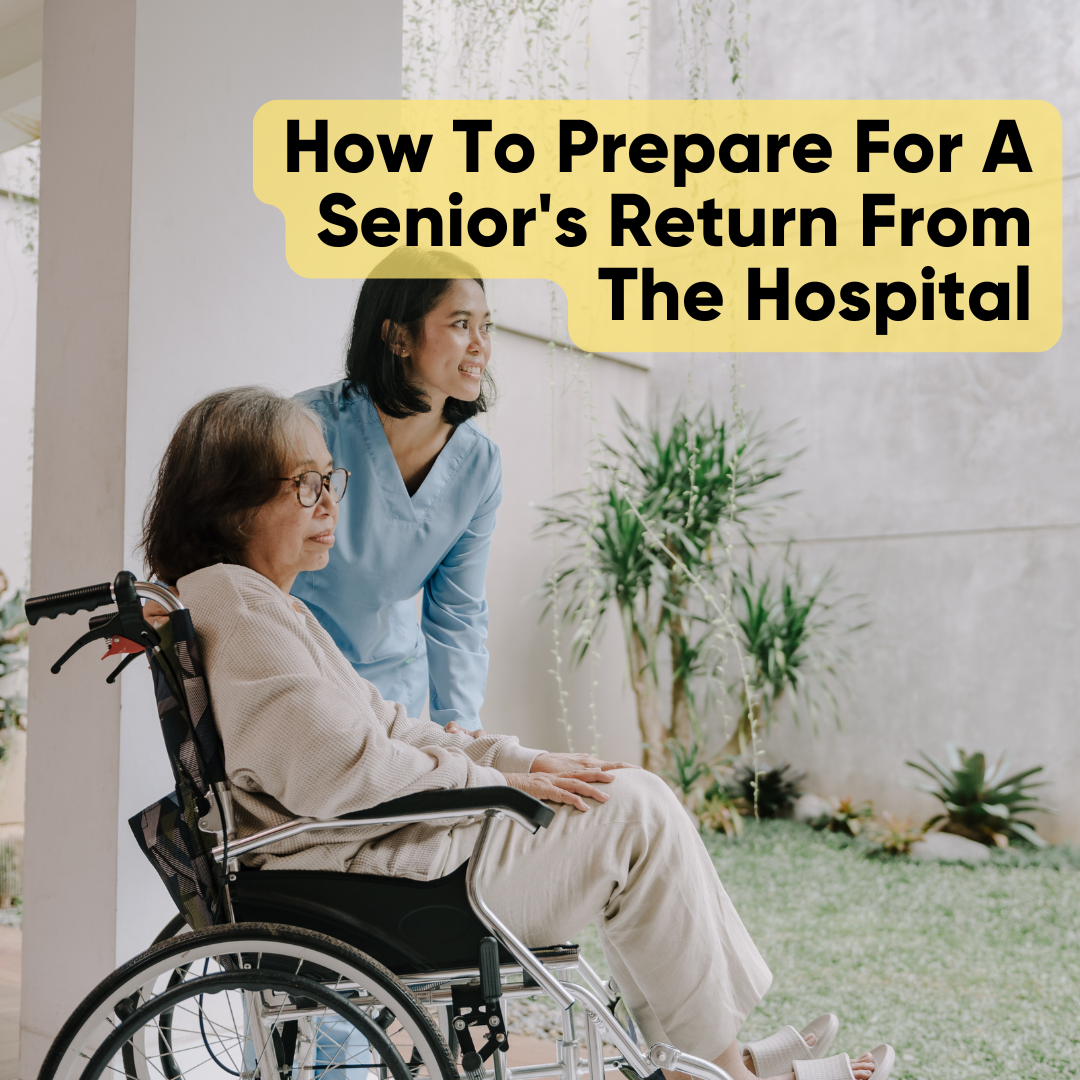Free SG local shipping for orders over $150. Express shipping options also available.
Menu
-
- Bestsellers
-
Mobility
-
Bathroom
-
Bedroom
-
Daily Living
-
About Us
-
- +65-8657-1657
- Contact Us
- Testimonials
- Product Reviews
- FAQs
- Login

Free SG local shipping for orders over $150. Express shipping options also available.
Add description, images, menus and links to your mega menu
A column with no settings can be used as a spacer
Link to your collections, sales and even external links
Add up to five columns
Add description, images, menus and links to your mega menu
A column with no settings can be used as a spacer
Link to your collections, sales and even external links
Add up to five columns
How To Prepare For A Senior's Return From The Hospital
July 24, 2024 4 min read

Bringing an elderly loved one back home from the hospital can be both a joyous and daunting experience. Whether they’ve been away due to surgery, illness, or a prolonged hospital stay, it's essential to ensure a smooth transition. Proper preparation can help prevent readmissions and provide comfort for your loved one.
Here's a comprehensive guide to help you prepare for their return.
Understand the discharge plan
Before your loved one leaves the hospital, thoroughly understand their discharge plan. This plan includes vital information about medications, dietary restrictions, physical activity limitations, and follow-up appointments. Ensure that you are familiar with the names, dosages, and schedules for all medications, and ask about potential side effects and interactions with other drugs or foods.
Understand any new dietary restrictions or recommendations and stock up on specific foods or supplements if necessary. Know which activities are safe and which ones to avoid, and ask if physical therapy or any special exercises are required. Finally, ensure all necessary appointments with doctors, specialists, or therapists are booked.
Prepare the home environment
A safe and comfortable home environment is crucial for recovery. Make necessary modifications to accommodate any physical limitations and to prevent accidents. Start by removing any tripping hazards such as loose rugs, electrical cords, and clutter. Ensure that walkways and frequently used areas are clear. In the bathroom, install grab bars in the shower and consider a shower chair, and for the toilet, a raised toilet seat if needed. Additionally, using a foldable walking frame or walker can provide extra stability and support, making it easier for them to move around the house safely.
Make sure non-slip mats are in place. Set up a comfortable and easily accessible sleeping area, and if your loved one’s bedroom is upstairs and mobility is an issue, consider creating a temporary bedroom on the ground floor. Place nightlights in hallways, bathrooms, and bedrooms to help prevent falls during nighttime trips. Lastly, arrange furniture so that commonly used items are within easy reach and avoid placing commonly-used items in areas that require stretching or bending.
Gather medical supplies
Make sure you have all necessary medical supplies ready before your elderly loved one returns home. Ensure prescriptions are filled and organised, and consider using a daily pill organiser to keep track of daily dosages. Depending on their condition, you might need items such as a lightweight wheelchair, walker, oxygen tank, or hospital bed. If the senior has surgical wounds or bedsores, stock up on dressings, antiseptic solutions, and other wound care products. Additionally, have a list of emergency contacts and important medical information easily accessible.
Plan for assistance
Determine the level of care your loved one will need and arrange for help accordingly. If necessary, hire a professional caregiver or nurse for assistance with daily activities, medication management, and medical care. Coordinate with family members to share caregiving responsibilities and create a schedule to ensure your loved one always has someone to assist them.
Look into community resources such as meal delivery services, transportation for medical appointments, and support groups. Additionally, consider the option of assisted living, which can provide a supportive environment with access to various services and social activities.
Prepare for emotional and mental health support
Recovery isn’t just about physical health; emotional and mental well-being are equally important. Encourage social interaction by arranging for visits from friends and family to prevent feelings of isolation. Virtual visits can also be beneficial if in-person visits aren’t possible.
Provide books, puzzles, or crafts to keep their mind active and engage in activities they enjoy, like watching favourite movies or listening to music. Be aware of signs of depression or anxiety, as hospital stays can be traumatic and adjusting to home life can be challenging. Don’t hesitate to seek professional help if needed.
Educate yourself
Being informed about your loved one’s condition and recovery process is vital. Research their condition to understand the specifics of their illness or surgery, including potential complications and warning signs. Familiarise yourself with any necessary care techniques, such as how to assist with mobility, wound care, or administering medications. Consider taking a basic first aid and CPR course to be prepared for any emergencies.
Maintain open communication
Regular communication with healthcare providers is essential for a successful recovery. Stay in contact with your loved one’s primary care physician and any specialists involved in their care. Regular updates and consultations can help manage any issues that arise. Utilise telehealth services for follow-up appointments or consultations, as this can be more convenient and reduce the need for travel.
Conclusion
Preparing for your elderly loved one’s return from the hospital requires careful planning and consideration. Remember, your support and care play a crucial role in their journey to regain health and independence. At The Golden Concepts, we curate a wide range of eldercare equipment, including essential mobility aids, such as walking frames and wheelchairs with detachable footrests, to ensure that our loved ones stay mobile and safe. Contact us today for more information.
Leave a comment
Comments will be approved before showing up.
Also in Caregiving

How to Choose the Best Lightweight Wheelchair for Elderly Parents
April 29, 2025 3 min read
Choosing the right wheelchair for an elderly parent can feel overwhelming, especially with so many options available today. A lightweight wheelchair offers greater mobility, ease of transport, and independence - key factors in enhancing your loved one’s quality of life.

